There are a lot of characters in Shakespeare's history plays, and we know it can be tough to keep them straight. So here's a brief "Who's Who" of some of the key players in the show.
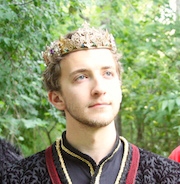
Henry VI is the only son of Henry V and Katherine of France. He became king at a very young age when his father died, so his uncle Humphrey of Gloucester was appointed Protector over him.
Henry is unlike anyone else in the play. He is a simple, deeply religious man who abhors conflict and only wants to ensure peace and harmony among his subjects. He may be the only character in the play who does not want to be king — in one famous speech, he longs for the simpler life of a shepherd. This attitude causes other members of the court to perceive him as weak and unfit to be king, and much of the action of the play involves other characters trying to control Henry, prevent others from exerting influence over him, or take the crown away from him.
There are two moments in the play, however, when Henry stands up against those who would try to control his actions: when he chooses the woman he will marry, and when he banishes the Duke of Suffolk — perhaps at least in part because of Suffolk's relationship with the woman Henry chose to marry...
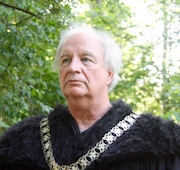
Humphrey, Duke of Gloucester is the youngest brother of Henry V and the uncle of Henry VI. When his brother died and Henry VI became king at a very young age, Gloucester was appointed Protector over the king.
These factors make him the most powerful man in England at the beginning of the play: as Protector, he has the greatest influence over the young king and is, in effect, the person really running the country. And as the brother of Henry V, Gloucester would be next in line to take the throne if anything were to happen to Henry VI.
Gloucester's power and influence make him a target for the other members of the court who are seeking to increase their own power and influence. The middle of our show is largely concerned with the way Gloucester's enemies, who otherwise would be fighting each other, band together to manufacture treason charges against Gloucester and have him removed from his position.
Gloucester himself is strongly devoted to the young king he serves and is beloved by the common people, who revere him for his devotion to the king and for the fact that he is the brother of Henry V.
Gloucester has a long-running feud with Cardinal Winchester...
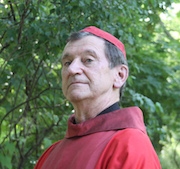
Cardinal Winchester, Henry Beaufort, is one of many illegitimate children of John of Gaunt. Though these Beaufort children were later made legitimate when John of Gaunt married his longtime mistress, they were still regarded as bastards by many of the other members of the royal family.
Winchester's position as a high-ranking member of the Church gives him a certain amount of power and status in the court, but it also makes others mistrust him — they fear the influence of the Church hierarchy in Rome over him.
His religious office certainly doesn't prevent him from seeking power by worldly means: Winchester is one of the key conspirators against his longtime nemesis, the man who actually has the power Winchester covets, Humphrey of Gloucester. It may be that his religious convictions get to him in the end, however, as his guilt over Humphrey's death drives him to the brink of madness...
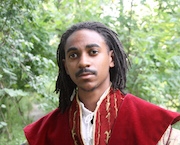
The Duke of Somerset, John Beaufort, is descended from another illegitimate son of John of Gaunt. One of the key supporters of Henry VI and the house of Lancaster, Somerset is also a strong opponent of Richard Plantagenet, the Duke of York.
Somerset and York were major rivals for positions of power in the court and for leadership of the English forces in France. The scene in which the Somerset-York feud first flares up — in the garden of the Inner Temple, one of the main law centers of London, where York and Somerset are arguing over some legal point — gave the name to the Wars of the Roses, as each of them asks the other courtiers to pluck white or red roses to signify their support for one or the other.
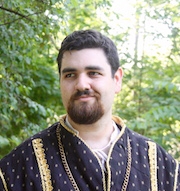
The Duke of Suffolk, William de la Pole, is one of the few key players at the court who is not a member of the royal family. The de la Poles were a wealthy merchant family who rose to power by providing financing to England's kings for their wars, beginning with Edward III. Suffolk is therefore "new money" to the other members of the court, looked down upon and resented as he climbs the ladder to power.
Knowing that he has no path to the throne himself, Suffolk comes up with another way to gain power: by convincing Henry VI to marry Margaret, and then exerting influence over her. Along the way, he and Margaret fall in love — not particularly convenient, since both of them were married to other people — and work together to engineer Duke Humphrey's downfall.
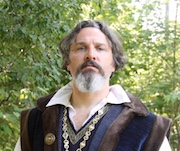
Richard Plantagenet, the Duke of York, is the leader of the house of York. He is descended directly from the original Duke of York, the fourth son of Edward III. But Richard's father, also named Richard, Earl of Cambridge, was married to the sister of Edmund Mortimer — who was descended from Lionel, Duke of Clarence, the second son of Edward III.
This link by marriage to the Mortimers allows Richard Plantagenet to argue that he has a stronger claim to the throne than Henry VI. Edmund Mortimer was declared the official heir to the throne by Richard II, who had no children. But before Mortimer could inherit, Henry Bolingbroke deposed Richard II and took the throne for himself, becoming Henry IV. Henry passed the crown down to his son, Henry V, and grandson, Henry VI — but they are all descended from the third son of Edward III, John of Gaunt, Duke of Lancaster.
In principle, the York/Mortimer claim tracing back to the second son should be stronger than the Lancaster claim tracing back to the third son. And early in our play, the dying Mortimer names Richard Plantagenet his heir. So why isn't Richard king? In part because his father, Earl of Cambridge, was one of the conspirators against Henry V in that play. They were trying to assassinate Henry V and put Edmund Mortimer on the throne. But their plan was discovered, and the Earl of Cambridge was executed for treason — putting his son, Richard Plantagenet, into disgrace.
At the beginning of Henry VI, Richard has been stripped of his title as Duke of York, and is taunted by the Duke of Somerset as a traitor. Richard works steadily to regain his title and build his power. He fights to regain English territories in France, captures Joan of Arc, and maneuvers behind the scenes until he is ready to make a public claim to the throne — even if it means going to war with the house of Lancaster to get it.
Richard is married to Cecily Neville, Duchess of York and sister to the Earl of Salisbury. He has four sons: Edward, the oldest, George, Richard, and his youngest son, Edmund, the Earl of Rutland.

Edward is the oldest son of Richard Plantagenet, and will eventually take the throne as King Edward IV. Edward is a skilled military commander who leads the York forces to their greatest victories. But he is also impulsive, confident to the point of cockiness, and possessed of strong appetites for wine, women, and the finer things in life. His sudden attraction to the Lady Grey, Elizabeth Woodville, a young widow, leads to an impetuous decision to marry her — breaking his word to Warwick and leading directly to Warwick's betrayal and a new set of wars with the house of Lancaster.

George, who later becomes the Duke of Clarence, is the second son of Richard Plantagenet. George is much more practical than his older brother Edward. When Edward becomes king, George recognizes the importance of seeking a marriage for Edward that will create a strong alliance between the house of York and the King of France. He is therefore shocked at Edward's impulsive decision to marry Elizabeth Woodville. George makes his disapproval clear to Edward — but in the end, when it counts, he stands with his brother and helps to defend Edward's throne.
George is married to the older daughter of the Earl of Warwick and is probably the person closest to his younger brother, Richard.

Richard, who later becomes the Duke of Gloucester, is the third son of Richard Plantagenet. Richard has several physical disabilities: by his own description, he has a withered arm, a hump on his back, and legs of uneven lengths. There are rumors that he was born feet first, with all his teeth, and caused his mother great pain in childbirth.
Richard has not had an easy life. He has been mocked and reviled for his appearance and his disabilities; even his own mother has found it difficult to show him affection. He is very much like his father, however, and has trained himself to be a skilled fighter in spite of his disabilities. He is intelligent and sharp-tongued, prone to sarcasm, a little hot-headed, and eager to fight.
Richard is not married and does not believe he will find a woman that can love him. His resentment of the treatment he has experienced throughout his life and his inability to find enjoyment in worldly pleasures lead him to plot a path to the throne for himself — even if he has to get rid of his own brothers to get there...
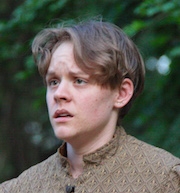
The Earl of Rutland, Edmund, is the youngest son of Richard Plantagenet, Duke of York. His father's joy, Rutland dreams of being able to go out and fight against the house of Lancaster along with his father and his brothers, Edward, George, and Richard. Rutland is too young to go out and fight, so he is stuck inside the York stronghold with his tutor when the forces of Lancaster march on them. With Young Clifford seeking vengeance for his father's death, however, Rutland is not too young to become a victim of the war...

The Earl of Warwick, Richard Neville, is one of the most powerful nobles in England. Warwick becomes known as "the Kingmaker" for his ability to win the throne for the candidate he champions.
Warwick is a principled supporter of the house of York, believing that Richard Plantagenet has a stronger claim to the throne than Henry VI. When Richard is killed, Warwick throws his support behind Richard's son, Edward, and sees him crowned as King Edward IV.
To strengthen Edward's hold on the throne, Warwick travels to France to arrange a marriage between Edward and the Lady Bona, sister to the King of France. This marriage would create a strong alliance between the house of York and France, assuring their success and preventing the house of Lancaster from appealing to France for aid. Warwick pledges his honor to the King of France that Edward is the rightful king of England — and is therefore furious when he learns that Edward has gone back on his word and married Elizabeth Woodville. Furious enough to switch sides...
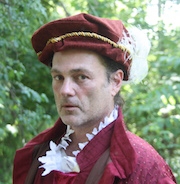
The Earl of Salisbury, also named Richard Neville, is Warwick's father and leader of the powerful Neville family from Northern England. His sister Cecily is married to Richard Plantagenet.
Salisbury's father was Ralph Neville, Earl of Westmorland, a strong supporter of both Henry IV and Henry V. Salisbury, however, like his son, believes that Richard Plantagenet has the stronger claim to the throne, so he supports the house of York against Henry VI and the Lancastrians. He fights and is wounded alongside Richard when the forces of Lancaster lay siege to Richard's castle in York.
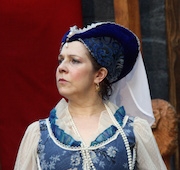
Queen Margaret starts out as Margaret of Anjou. She is the daughter of Reignier, the Duke of Anjou, a French nobleman and advisor to Charles, the Dauphin and future king of France. In addition to being Duke of Anjou, Reignier has inherited the titles of King of Naples, Sicily, and Jerusalem — which sounds impressive, but his titles there were contested and he had little actual control of those areas. More importantly, Reignier was not wealthy (by the standards of a medieval French nobleman, at least), and so could not provide a large dowry for the marriage of his daughter, Margaret.
Margaret's life changes when the English try to recapture their territories in France. She is captured by the Duke of Suffolk, who becomes immediately infatuated with her. Since Suffolk is already married, he offers to arrange for her to marry the young King Henry VI. Suffolk convinces Henry to marry Margaret, and so the poor Duke's daughter becomes the Queen of England.
Margaret is a strong woman who fights furiously for her family and their rights. She had expected King Henry to be like the Duke of Suffolk, who swept her off her feet in France — and so is surprised and disappointed when she discovers his inclination to meditation and spiritual study. Margaret takes over leadership of the House of Lancaster when Henry falters, and becomes the real ruler of England. There are rumors that she is carrying on an affair with the Duke of Suffolk, and some people question whether Henry is really the father of her son, Prince Edward, heir to the throne — though not to her face...
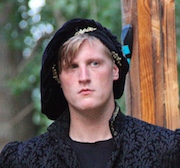
Prince Edward is the only son of Henry VI (presumably) and Queen Margaret. As such, he is the heir to the throne as long as Henry VI is king — until Henry makes an agreement with Richard Plantagenet, Duke of York, that would allow the crown to pass to York after Henry's death. This agreement strips Prince Edward of his right to inherit the throne. Henry agrees to the arrangement with York in order to stop the civil war that was killing so many Englishmen, but it infuriates Queen Margaret, and she refuses to honor it.
Prince Edward is much like his mother, a fierce defender of the Lancaster right to the throne. When Margaret goes to war with York to protect her son's right to the throne, Prince Edward is right beside her. During the play, he becomes betrothed to the youngest daughter of the Earl of Warwick — a certain Lady Anne, who might become important in a future play...
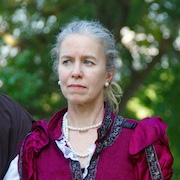
Eleanor Cobham, Duchess of Gloucester, is the wife of Humphrey, Duke of Gloucester. Humphrey is the uncle and Protector to King Henry VI, and would be the next in line for the English throne if anything were to happen to Henry. That makes Eleanor, as Humphrey says, "second woman of the realm" — second only to Queen Margaret.
Eleanor, however, is not content with second place — especially when first place belongs to the "proud Frenchwoman," Margaret. Eleanor wants Humphrey to be king, and herself to be queen. Since she has no direct way to make that happen, she finds a shady character, Sir John Hume, who can connect her with a conjuror named Roger Bolingbroke. They promise to raise a spirit that will help her in her quest for the crown. Unfortunately for Eleanor, Hume is playing both sides in this rivalry...
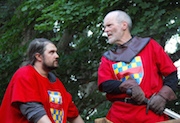
Sir Thomas Clifford and his son, Young Clifford, are much lower in rank than most other members of the nobility in this play. Sir Thomas is a baron, which ranks him below all the Dukes and Earls around him. Clifford, however, is a strong military commander, so the Cliffords are brought in when the Lancasters need some extra muscle — first to deal with the Jack Cade rebellion, and then for the first round of civil wars between the houses of Lancaster and York. They are loyal Lancastrians who serve King Henry and Queen Margaret, who is the true leader in the fight against the Yorks.

Edmund Mortimer has been an important figure in several of the plays in this sequence. The Mortimers married into the line of Lionel, Duke of Clarence, the second son of Edward III. As a result, Edmund Mortimer was declared the official heir to the throne by Richard II, who had no children. Mortimer's claim, though, went out the window when Henry Bolingbroke — descended from the third son of Edward III, John of Gaunt — deposed Richard and made himself King Henry IV.
The rebellions by Hotspur and Owen Glendower that broke out against Henry IV's rule were aimed at putting Mortimer on the throne, since one of Mortimer's sisters, Kate, was married to Hotspur, and Mortimer himself married Glendower's daughter. That rebellion failed, however, and Mortimer was imprisoned in the Tower.
Mortimer's other sister, Anne, was married to Richard, Earl of Cambridge, who led the attempt to kill Henry V and again put Mortimer on the throne. That attempt, unfortunately for the conspirators, also failed. But the Earl of Cambridge's son — Mortimer's nephew — is Richard Plantagenet, Duke of York. And now Mortimer, dying in prison in the Tower, declares Richard Plantagenet the heir to his claim to the throne, setting the stage for the house of York to rise up once again against the current Lancastrian king, Henry VI...
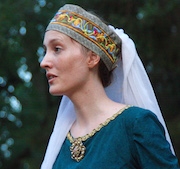
Elizabeth Woodville, Lady Grey, is the widow of Sir Richard Grey, who fought against the house of Lancaster on the side of the Yorks. When her husband was killed, their lands were seized by the Lancastrians, and then passed into the hands of the Yorks when the Yorks captured Henry VI and Edward IV became king. Elizabeth comes to Edward with a petition to have her family's lands returned to her. Edward immediately becomes infatuated with her, and when she spurns his advances — something that perhaps no woman has ever done? — the new king rashly offers to make her his queen...

Jack Cade is a commoner from Kent. Now a clothier, he previously served as a soldier in Ireland under the command of Richard Plantagenet, Duke of York. York remembers some of Cade's wild exploits against the Irish, spying on them and laughing off wounds as if they were nothing. When York is again sent to Ireland, he orders the charismatic Cade to start a rebellion in England against Henry VI. The commons rise up under Cade, striking out agains the nobility who they feel have been oppressing them for centuries. Whether by accident or design, the rebellion spins wildly out of control, threatening to destroy London and tear the country apart...

Charles, the Dauphin of France, is the heir to the French throne. He is the son of Charles VI, the mad king of France from Henry V, and the younger brother of the Dauphin who died in that play. He will go on to become the next king of France, Charles VII. He is engaged in a war to reclaim territories in France that were taken by Henry V. And, with the help of Joan of Arc, he is winning...

Joan of Arc, also called Joan la Pucelle, is the daughter of a French shepherd who now is leading the French armies in their battle to retake their lands from the English. To the French, she is a holy prophetess, inspired by God and filled with holy power. To the English, she is a witch who has gained unnatural powers by trafficking with evil spirits. She is unquestionably a great warrior who turns the tide in favor of the French against the English armies led by Sir John Talbot — in part because the English forces are divided by the squabbling between their leaders, the Dukes of York and Somerset. But once the English commanders join together, the tide begins to turn again...

Louis XI is the son of Charles VII, and becomes king of France after his father. Louis is the king of France during the height of the civil war between York and Lancaster, and plays a key role in the Wars of the Roses. When the house of York captures Henry VI and the Duke of York's oldest son, Edward, is made Edward IV, the Earl of Warwick travels to France to arrange a marriage between Edward and Louis' sister, Lady Bona. But when news arrives that Edward has impulsively married Elizabeth Woodville instead, both Louis and Warwick are insulted and throw their support behind Queen Margaret and the house of Lancaster instead.